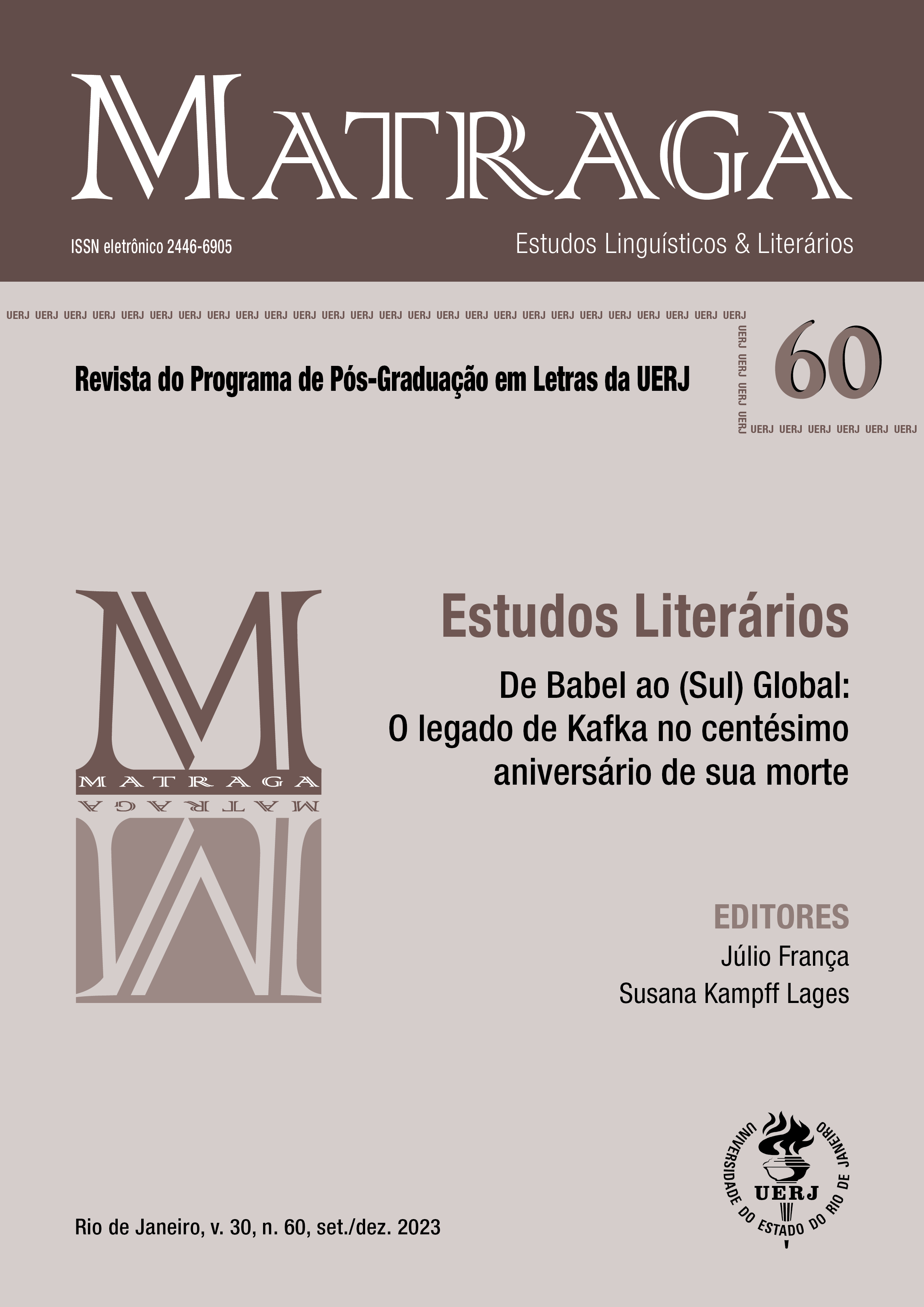Franz Kafka: The rebellion against the Bildungsroman
DOI:
https://doi.org/10.12957/matraga.2023.79274Keywords:
kafka, literature and life, the coming of age novel (Bildungsroman), women, objectsAbstract
Kafka’s famous phrase “My life is literature” is more wishful thinking than reality, for much of his letters and diaries show that this was not the case. Literature was more of an escape, an exhausting and often unsuccessful attempt to save himself from the life he was facing. If we assume that the Bildungsroman is one of the best-known literary forms in which life becomes literature and literature appears as life, it is not surprising that we can interpret Kafka’s narrative, both in his fragmentary novels and in his short stories, as a confrontation and, moreover, as a rebellion against the writing of the Bildungsroman, both in its themes and motifs and in its literary form. Education and formation (Bildung) have become problematic not only in Kafka’s individual life, but more generally as the basis of a bourgeois society whose ethical and metaphysical beliefs and social practices have become deeply questionable. This article therefore proposes to read Kafka’s narrative as a rebellion, a rebellion against the Bildungsroman.
Downloads
References
ADORNO, Theodor W. Aufzeichnungen zu Kafka. In: Gesammelte Schriften. Frankfurt: Suhrkamp, 1977, t. 10.1., p. 254-287.
BENJAMIN, Walter. Franz Kafka. Zur zehnten Wiederkehr seines Todestages. In: Gesammelte Schriften, Frankfurt: Suhrkamp, 1991, vol. II, t. 2. p. 409-438.
BENJAMIN, Walter. Der Erzähler. Betrachtungen zum Werk Nikolai Lesskows. In: Gesammelte Schriften. Frankfurt: Suhrkamp, 1991, vol. II, t. 2, p. 438-465.
DELEUZE, Gilles & GUATTARI, Félix. Por una literatura menor. Traducción de Jorge Aguilar Mora. Méxi¬co Ciudad: Era, 1990.
ETTE, Ottmar. Aufbruch. Literatur als Lebenswissen, Literaturwissenschaft als Lebenswissenschaft? In: Über¬Lebenswissen. Die Aufgabe der Philologie. Berlin: Kadmos, 2004, p. 9-22.
FISCHER, Ulrich. Asbest. Franz Kafka als Unternehmer. Göttingen: Wallstein, 2022.
GOETHE, Johann Wolfgang. Fausto II. Traducción de Pedro Gálvez y Carlos Fortes. London: Penguin Clas¬sics, 2006.
GOETHE, Johann Wolfgang. Wilhelm Meisters Lehrjahre. Frankfurt am Main: Suhrkamp, 2007. (Suhrkamp BasisBibliotek. Mit einem Kommentar von Joachim Hagner)
HEGEL, Georg Wilhelm Friedrich. Werke 14. Vorlesungen über die Ästhetik. Frankfurt: Suhrkamp, 1970, t. 2, p. 220.
JENS, Walter. Ich bin Ende oder Anfang. Conferencia (1988). Disponible en: <https://www.google.com/search?q=Walter+Jens+ich+bin+Ende+oder+Anfang&rlz=1C5CHFA_enCL978CL978&oq=Walter+Jens+ich+bin+Ende+oder+Anfang&aqs=chrome..69i57j33i60.233685664j0j15&sourceid=chrome&ie=UTF8#fps-tate=ive&vld=cid:c1d9c2d1,vid:ANuqa8t4J0c>. Acceso: 15/8/2023.
KAFKA, Franz. Amerika (oder: Der Verschollene). Disponible en: Projekt Gutenberg: <https://www.projekt¬-gutenberg.org/kafka/amerika/amerika.html>. Acceso: 15/8/2023.
KAFKA, Franz. Der Brief an den Vater. Disponible en: Projekt Gutenberg: <https://www.projekt-gutenberg. org/kafka/vater/vater.html>. Acceso: 30/8/2023.
KAFKA, Franz. Briefe an Felice. Disponible en: <https://homepage.univie.ac.at/werner.haas/1913/tb13-019. htm>. Acceso: 30/8/2023.
KAFKA, Franz. Der Prozess. (Primera publicación 1925). Disponible en: Projekt Gutenberg. https://www. projekt-gutenberg.org/kafka/prozess/prozess.html (Acceso: 15.8.2023)
KAFKA, Franz. Das Schloss. Disponible en: Projekt Gutenberg. https://www.projekt-gutenberg.org/kafka/ schloss/schloss.html (Acceso: 15.8.2023)
KAFKA, Franz. Tagebücher 1910-1923. Disponible en: Projekt Gutenberg. https://www.projekt-gutenberg. org/kafka/tagebuch/tagebuch.html (Acceso: 20.8.2023)
KAFKA, Franz. In der Strafkolonie. Disponible en: Projekt Gutenberg. https://www.projekt-gutenberg.org/ kafka/strafkol/strafkol.html (Acceso: 15.8.2023)
KAFKA, Franz. Der Bau. Disponible en: Projekt Gutenberg: <https://www.projekt-gutenberg.org/kafka/bau/ bau.html>. Acceso: 20/8/2023.
KAFKA, Franz. Die Verwandlung. Disponible en: Projekt Gutenberg: <https://www.projekt-gutenberg.org/ kafka/verwandl/verwandl.html>. Acceso: 20/8/2023.
KAFKA, Franz. Ein Bericht für eine Akademie. En: KAFKA, Franz. Erzählungen I. Disponible en: Projekt Gutenberg: <https://www.projekt-gutenberg.org/kafka/erzaehlg/chap002.html>. Acceso: 20/8/2023.
KAFKA, Franz. Eine kaiserliche Botschaft. En: KAFKA, Franz. Erzählungen I. Disponible en: Projekt Guten¬berg: <https://www.projekt-gutenberg.org/kafka/erzaehlg/chap007.html>. Acceso: 20/8/2023.
KAFKA, Franz. Ein Hungerkünstler. En: KAFKA, Franz. Erzählungen I. Disponible en: Projekt Gutenberg: <https://www.projekt-gutenberg.org/kafka/erzaehlg/chap020.html>. Acceso: 20/8/2023.
KAFKA, Franz. Das Urteil. En: KAFKA, Franz. Erzählungen I. Disponible en: Projekt Gutenberg: . Acceso: 20/8/2023.
LUKÁCS, Georg. Die Theorie des Romans. Neuwied/ Berlin: Luchterhand, 1971.
LUKÁCS, Georg. Geschichte und Klassenbewusstsein. Neuwied/ Berlin: Luchterhand, 1974.
MARX, Karl. Manifest der kommunistischen Partei. Disponible en: <https://www.ibiblio.org/ml/libri/e/En¬gelsFMarxKH_ManifestKommunistischen_s.pdf >. Acceso: 30/8/2023.
SCHLEGEL, Friedrich. Athenäums-Fragmente. Disponible en: <http://www.zeno.org/Literatur/M/Schle-gel,+Friedrich/Fragmentensammlungen/Fragmente>. Acceso: 20/8/2023.
SELBMANN, Rolf. Der deutsche Bildungsroman. 2. überarbeitete. und erweiterte Auflage. Stuttgart/Wei¬mar: Metzler, 1994.
Downloads
Published
How to Cite
Issue
Section
License

This work is licensed under a Creative Commons Attribution-NonCommercial 4.0 International License.
Authorization
Matraga – Scientific Journal of the Post-graduate Program in Arts and Humanities of UERJ is authorized to publish the article submitted here, if it is accepted for online publication. It is attested that the contribution is original, that it is not being submitted to another publisher for publication, and that this statement is the expression of truth.
The works published in Matraga's virtual space – Scientific Journal of the Post-graduate Program in Arts and Humanities of UERJ will be automatically transferred, and your copyright is reserved to Matraga. Its reproduction, in whole or in part, is conditional on the citation of the authors and the data of the publication.

Matraga uses license Creative Commons - Attribution-Non-Commercial 4.0 International.





